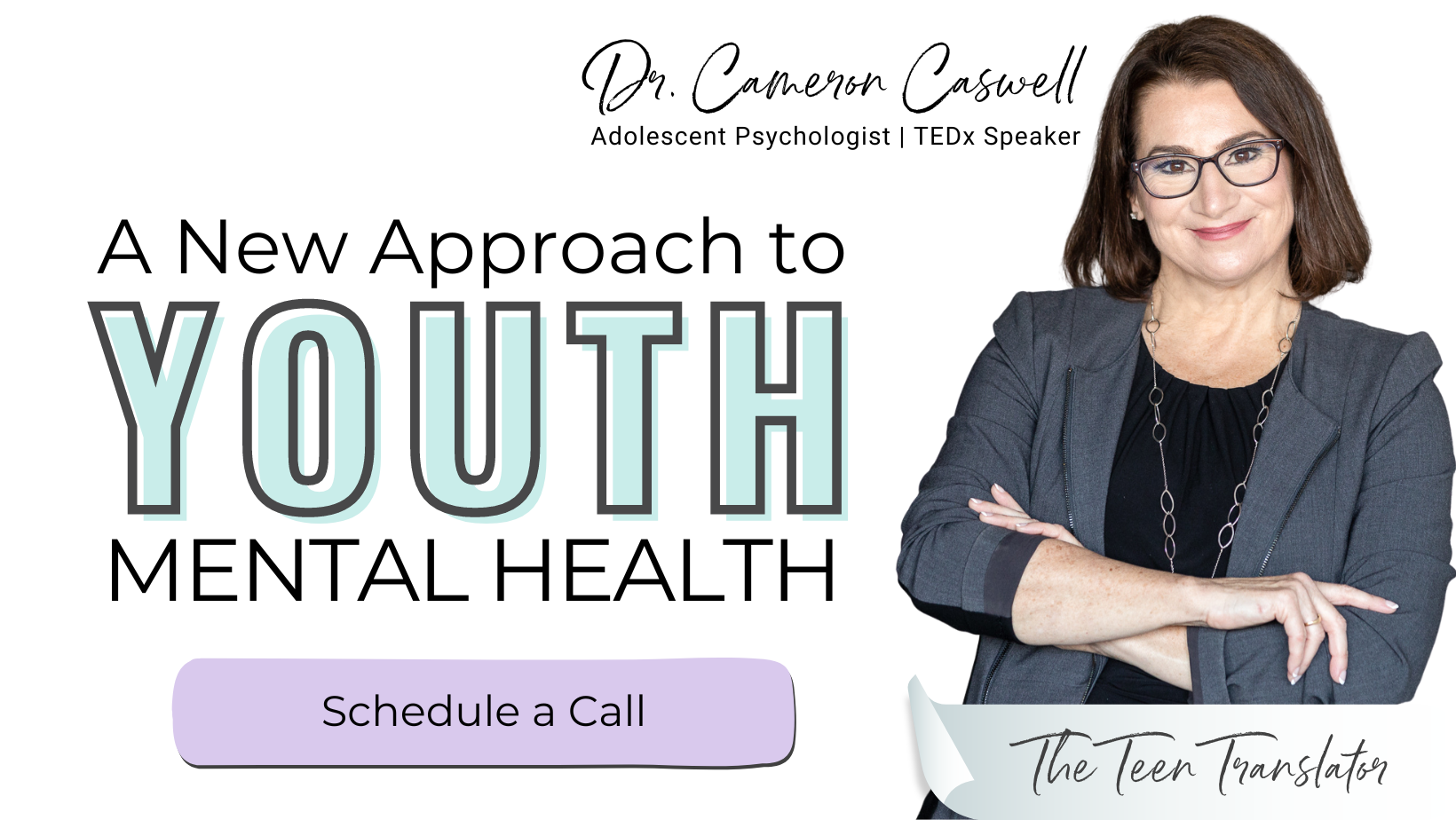Parenting Teens with Dr. Cam
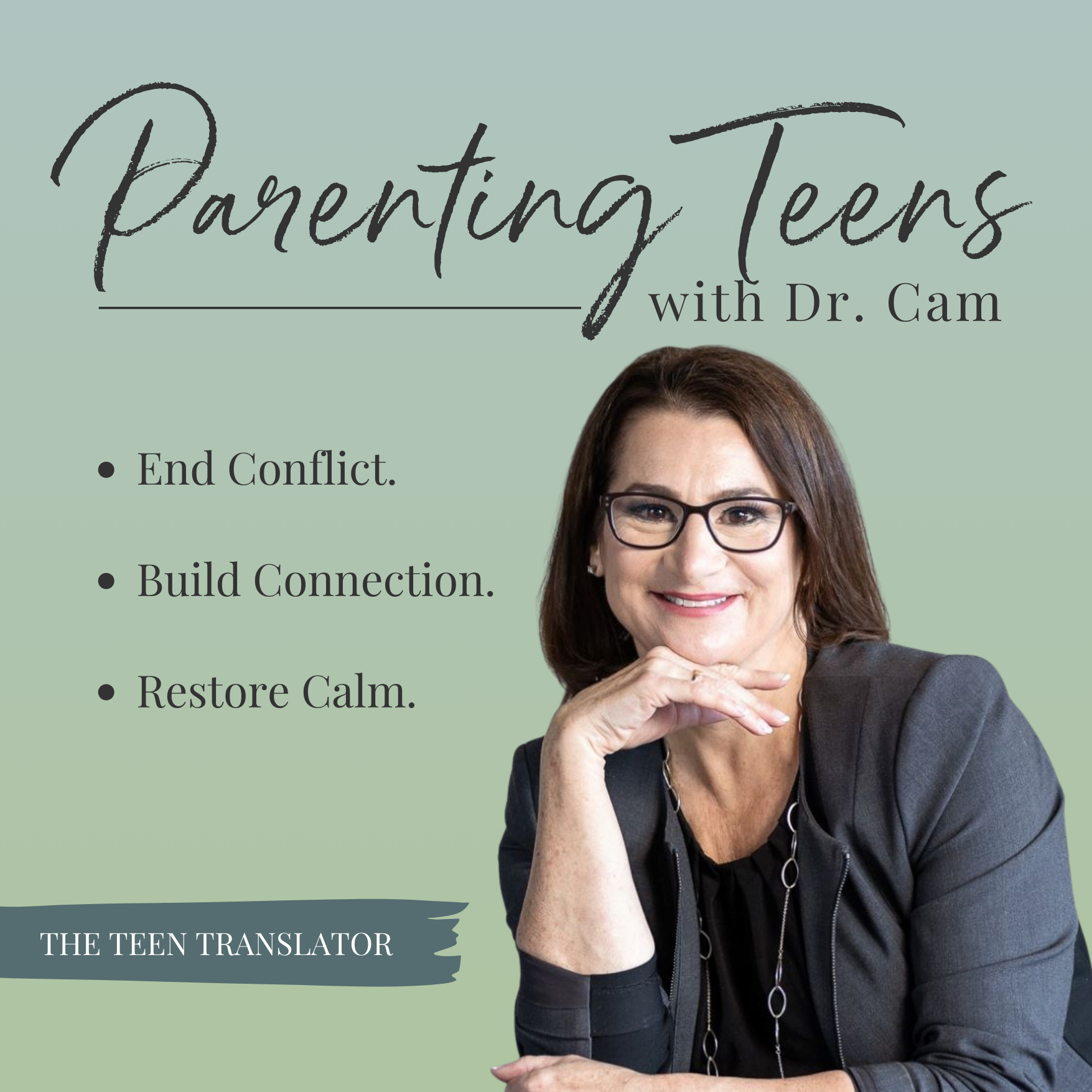
Parenting Teens Got You Stressed? 🎙️ Dr. Cam—The Teen Translator—Has Answers! Parenting Teens with Dr. Cam is the go-to podcast for parents who are ready to get real about raising teenagers. Hosted by Dr. Cam Caswell—adolescent psychologist, certified parenting coach, and mom of a teen—this podcast is all about honest conversations that dive deep into the challenges parents face and providing actionable solutions that actually work. Dr. Cam doesn’t just talk theories—she shares real-life insights and strategies based on over a decade of experience and the struggles she faces as a mom herself. Every episode offers practical, science-backed solutions to help you understand your teen, improve communication, and build a stronger relationship. Whether you’re dealing with mood swings, defiance, anxiety, or social media issues, you’ll find easy-to-apply advice that makes a difference. No interviews here—just authentic conversations that get to the heart of what parents are really dealing with. With a mix of expert tips and Dr. Cam’s own relatable stories, you’ll walk away with the tools you need to tackle even the toughest teen challenges with confidence. #Parenting #ParentingTips #ParentingAdvice #ParentingLife #ParentingSupport #TeenParenting #Teenagers #RaisingTeens #ParentingTeens #TeenBehavior #TeenCommunication #TeenMotivation #TeenDevelopment #AdolescentDevelopment #ParentTeenConnection #TeenMentalHealth #DrCam #TheTeenTranslator
Parenting Teens Got You Stressed? 🎙️ Dr. Cam—The Teen Translator—Has Answers! Parenting Teens with Dr. Cam is the go-to podcast for parents who are ready to get real about raising teenagers. Hosted by Dr. Cam Caswell—adolescent psychologist, certified parenting coach, and mom of a teen—this podcast is all about honest conversations that dive deep into the challenges parents face and providing actionable solutions that actually work. Dr. Cam doesn’t just talk theories—she shares real-life insights and strategies based on over a decade of experience and the struggles she faces as a mom herself. Every episode offers practical, science-backed solutions to help you understand your teen, improve communication, and build a stronger relationship. Whether you’re dealing with mood swings, defiance, anxiety, or social media issues, you’ll find easy-to-apply advice that makes a difference. No interviews here—just authentic conversations that get to the heart of what parents are really dealing with. With a mix of expert tips and Dr. Cam’s own relatable stories, you’ll walk away with the tools you need to tackle even the toughest teen challenges with confidence. #Parenting #ParentingTips #ParentingAdvice #ParentingLife #ParentingSupport #TeenParenting #Teenagers #RaisingTeens #ParentingTeens #TeenBehavior #TeenCommunication #TeenMotivation #TeenDevelopment #AdolescentDevelopment #ParentTeenConnection #TeenMentalHealth #DrCam #TheTeenTranslator
Episodes
Episodes
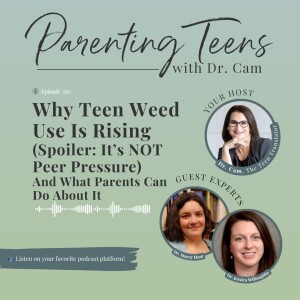


Tuesday Jun 24, 2025
Tuesday Jun 24, 2025
Think your teen is using weed because of peer pressure? Think again. In this powerful episode, Dr. Cam sits down with Dr. Jessica Willoughby and Dr. Stacey Hust from the WSU Media Adolescent Cannabis (MAC) Lab to unpack the real reasons behind rising teen cannabis use—and what parents can actually do about it.
Backed by groundbreaking research, this episode explores how savvy marketing, social media influence, and misleading packaging—not just peer dynamics—are shaping teen decisions. If you've ever felt unsure about how to talk to your teen about weed, you're not alone. This episode gives you the insights, tools, and language to have real, meaningful conversations without losing the connection.
WHAT YOU’LL LEARN IN THIS EPISODE
Why peer pressure is notthe main reason teens are using weed today
How marketing, packaging, and perceived norms shape your teen’s choices
What THC-labeled gummies and “natural” branding are really doing to teen perception
Harm reduction strategies that actually work when prevention isn’t enough
🎧❤️ ENJOYING THE SHOW?
If this episode gave you clarity, confidence, or just made you feel a little more understood, hit that ⭐️ and leave a review! Your feedback helps more parents find support and lets me keep delivering real-talk episodes that make a difference.
🔔 Make sure to hit SUBSCRIBE so you never miss an episode.
RESOURCES MENTIONED IN THIS EPISODE
WSU MAC Lab
SAMHSA National Helpline
NIDA—Cannabis
CDC—Cannabis and Teens
Teens, Sex and Media Effects: Understanding Media's Influence on Adolescent Sexuality, Sexual Health, and Advocacy
CONNECT WITH OUR GUESTS
Dr. Stacey Hust Email: sjhust@wsu.edu LinkedIn: Stacey Hust BlueSky: staceyhust@bsky.social
Dr. Jessica Willoughby Email: jessica.willoughby@wsu.edu LinkedIn: Jessica Fitts Willoughby BlueSky: @jwilloughby.bsky.social
CONNECT WITH YOUR HOST: Dr. Cam Caswell
Website: AskDrCam.com
Instagram: @DrCamCaswell
TikTok: @the.teen.translator
YouTube: Parenting Teens with Dr. Cam
Facebook: @DrCamCaswell
EPISODE CHAPTERS
00:00 Understanding Teen Cannabis Use 03:06 The Impact of Cannabis on the Adolescent Brain 07:30 Navigating Conversations with Teens 12:15 Harm Reduction Strategies for Parents 19:53 The Role of Marketing in Teen Cannabis Use 25:17 Addressing the Challenges of Edibles 30:29 Ethical Dilemmas in Parenting and Cannabis 32:28 Starting Early: Conversations About Cannabis
ABOUT THE SHOW
Parenting Teens with Dr. Cam is your go-to podcast for real-world parenting strategies backed by psychology, neuroscience, and a whole lot of empathy. Hosted by adolescent psychologist Dr. Cam Caswell, each episode delivers practical tips and honest conversations that help you better understand your teen—and yourself. Whether you're facing eye rolls or emotional breakdowns, this show is here to help you parent smarter, not harder.
#theteentranslator #teenweeduse #parentingteenswithdrcam
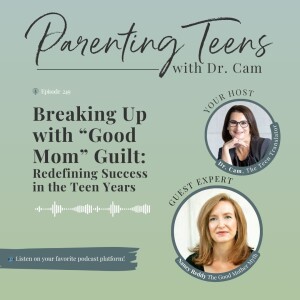


Sunday Jun 15, 2025
Breaking Up with “Good Mom” Guilt: Redefining Success in the Teen Years
Sunday Jun 15, 2025
Sunday Jun 15, 2025
In this must-listen episode of Parenting Teens with Dr. Cam, adolescent psychologist and parenting coach Dr. Cam Caswell sits down with writer and professor Nancy Reddy, author of The Good Mother Myth, to unpack the crushing weight of unrealistic parenting expectations.
Together, they explore how outdated beliefs about “good” parenting are fueling unnecessary guilt and stress—especially for moms of teens. You’ll learn the difference between helpful guilt and harmful shame, how to let go of perfectionism, and how to reframe your role as your teen grows more independent.
Nancy also shares the liberating truth about asking for help and why showing vulnerability is one of the best lessons you can teach your teen.
This episode is both a sigh of relief and a wake-up call. If you're tired of feeling like you're not doing enough, listen in.
WHAT YOU'LL LEARN IN THIS EPISODE
How outdated “good mom” myths create toxic guilt for modern parents.
The truth about your role in your teen’s happiness (and why it’s not what you think)
Why modeling imperfection and asking for help makes you a better parent
Practical tips to release shame, reclaim calm, and parent from your values
5 KEY TAKEAWAYS FOR PARENTS OF TEENS
Guilt ≠ Shame: Guilt can spark change, but shame keeps you stuck in self-blame
Use a values check when guilt creeps in—what matters to your family, not to others
Build a “friend family” of supportive adults to share the emotional and logistical load
Ask for help—and watch how it gives your teen permission to do the same
Focus on the relationship, not your performance. You’re a parent, not a perfectionist
🎧❤️ ENJOYING THE SHOW? Don’t keep it to yourself! Share your favorite episode and leave a rating and review to help other parents find the support they need. Your feedback helps me create even more episodes filled with practical tips for you and your family! Thanks so much for your support! 🙏💫
🔔 Remember to hit SUBSCRIBE so you never miss another solution-packed episode! 🙌
RESOURCES MENTIONED IN THIS EPISODE
The Good Mother Myth by Nancy Reddy
Write More, Be Less Careful Newsletter
Work Like a Mother by Laura Bazelon
Unfit Parent by Jessica Slice
Research by Erica Boothby on “the liking gap”
Anthropological research by Margaret Mead
CONNECT WITH OUR GUEST: Nancy Reddy
Website: nancyreddy.com
Instagram: @nancy.o.reddy
Newsletter: Write More, Be Less Careful
CONNECT WITH YOUR HOST: Dr. Cam Caswell
Website: AskDrCam.com
Instagram: @DrCamCaswell
TikTok: @the.teen.translator
YouTube: Parenting Teens with Dr. Cam
Facebook: @DrCamCaswell
EPISODE CHAPTERS
00:00 The Pressure of Perfection in Motherhood 03:12 Navigating the Transition to Parenting Teens 06:05 Understanding and Overcoming Mom Guilt 09:01 The Myth of the Perfect Mother 12:03 Distinguishing Guilt from Accountability 14:48 Letting Go of Guilt and Embracing Trust 18:11 The Role of Community and Co-Parenting 21:22 Navigating New Motherhood and Guilt 24:38 The Role of Community in Parenting 26:10 Understanding Guilt in Parenting 30:09 The Importance of Asking for Help 33:11 Modeling Vulnerability for Our Children 38:34 Defining Values to Combat Guilt
ABOUT THE SHOW
The Parenting Teens with Dr. Cam Podcast is your go-to resource for navigating the challenges of raising teenagers. Hosted by Dr. Cam Caswell, an adolescent psychologist and certified parenting coach, this podcast offers practical parenting strategies, expert advice, and real-world insights to help you build a stronger relationship with your teen and support their emotional growth.
Whether you’re struggling with teenage behavior or looking to improve communication, each episode provides actionable tips to make parenting teens easier and more rewarding. Perfect for both new and seasoned parents, this podcast helps you build the confidence to handle teen challenges and thrive together.
#theteentranslator #drcamcaswell #parentingteenswithdrcam #momguilt #parentingteens #mentalhealthformoms #parentinghelp
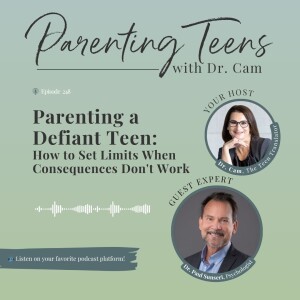


Tuesday Jun 03, 2025
Parenting a Defiant Teen: How to Set Limits When Consequences Don't Work
Tuesday Jun 03, 2025
Tuesday Jun 03, 2025
Are you stuck in constant battles with your teen—no matter how many consequences you hand out? You're not alone. In this episode of Parenting Teens with Dr. Cam, I sit down with renowned psychologist and TEDx speaker Dr. Paul Sunseri, author of Gentle Parenting Reimagined. With over 40 years of experience, Dr. Sunseri offers parents a powerful shift: how to stay calm, set firm boundaries, and transform behavior—without yelling or giving in. If you’ve got a strong-willed or defiant teen, this episode will be a game-changer.
WHAT YOU'LL LEARN IN THIS EPISODE
What to do when consequences no longer work with your teen
How to set effective boundaries without yelling or power struggles
The difference between gentle parenting and permissiveness
How to tie privileges (like screen time) to responsibility
5 KEY TAKEAWAYS FOR PARENTS OF TEENS
Shift from “Fixing the Kid” to Changing the Dynamic: Teen defiance is often about the relationship, not just behavior. Focus on how you respond.
Speak Calmly and Clearly: Avoid emotional reactions. Use matter-of-fact requests to maintain authority without fueling conflict.
Use Privileges Strategically: Tie screen time and other privileges to daily responsibilities—then follow through consistently.
Expect Resistance, But Stay the Course: Change won’t happen overnight. Stay patient and consistent even when it’s tough.
Believe in Their Ability to Grow: Set high (yet compassionate) expectations. Let them fail and learn—it’s how resilience is built.
🎧❤️ ENJOYING THE SHOW? Don’t keep it to yourself! Share your favorite episode and leave a rating and review to help other parents find the support they need. Your feedback helps me create even more episodes filled with practical tips for you and your family! 🙏💫
🔔 SUBSCRIBE so you never miss another solution-packed episode! 🙌
RESOURCES MENTIONED IN THIS EPISODE
Gentle Parenting When to Lean Out Instead of Leaning In – Psychology Today
Consequences Don’t Work With My Kid – Psychology Today
Gentle Parenting Deserves Another Chance – Today’s Parent
CONNECT WITH OUR GUEST: Dr. Paul Sunseri
Website: myIFFT.org
Instagram: @dr_paul_challengingkids
YouTube: Dr. Paul Sunseri
CONNECT WITH YOUR HOST: Dr. Cam Caswell
Website: AskDrCam.com
Instagram: @DrCamCaswell
TikTok: @the.teen.translator
YouTube: Parenting Teens with Dr. Cam
Facebook: @DrCamCaswell
EPISODE CHAPTERS:
00:00 Understanding Defiance in Teens05:13 The Bi-Directional Influence of Behavior10:05 Common Mistakes Parents Make18:10 Navigating Emotional Regulation28:03 Strategies for Managing Household Responsibilities30:36 The Autonomy Dilemma in Parenting32:26 Effective Communication Strategies with Teens34:20 Flexibility and Boundaries in Parenting36:12 Motivation and Homework Challenges39:00 Understanding Teen Resistance to Homework42:31 Balancing Privileges and Responsibilities45:41 Negotiating Homework and Screen Time48:56 Navigating Homework Expectations51:17 Establishing Behavioral Habits54:36 Setting Realistic Parenting Goals57:38 The Importance of Limits and Expectations01:01:29 Building Resilience Through Challenges01:05:33 Parenting Across Generations
ABOUT THE SHOW
The Parenting Teens with Dr. Cam Podcast is your go-to resource for navigating the challenges of raising teenagers. Hosted by Dr. Cam Caswell, an adolescent psychologist and certified parenting coach, this podcast offers practical parenting strategies, expert advice, and real-world insights to help you build a stronger relationship with your teen and support their emotional growth. Whether you’re struggling with teenage behavior or looking to improve communication, each episode provides actionable tips to make parenting teens easier and more rewarding. Perfect for both new and seasoned parents, this podcast helps you build the confidence to handle teen challenges and thrive together.
#theteentranslator #parentingdefiantteens
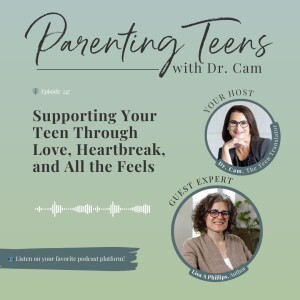


Tuesday May 27, 2025
Supporting Your Teen Through Love, Heartbreak, and All the Feels
Tuesday May 27, 2025
Tuesday May 27, 2025
When your teen falls in love for the first time—or goes through their first heartbreak—it can be emotional for everyone. You want to protect them, guide them, and maybe even stop them from getting hurt. But if you're not careful, your good intentions can push them away. In this episode, I’m joined by journalist, professor, and fellow mom Lisa A. Phillips, author of First Love: Guiding Teens Through Relationships and Heartbreak. Lisa shares powerful insight from her personal and professional journey helping teens—and parents—navigate the emotional rollercoaster of young love. If you’re wondering how to talk to your teen about dating, heartbreak, or those “red flag” relationships without causing shutdown or secrecy, this conversation is a must-listen.
WHAT YOU'LL LEARN IN THIS EPISODE
Why teens hide their relationships—and how to keep the conversation open
How to support your teen through their first heartbreak without minimizing their pain
What to say when you’re worried about who your teen is dating
How sharing your relationship experiences can actually help your teen make better choices
5 KEY TAKEAWAYS FOR PARENTS OF TEENS
Validation builds trust: When your teen opens up about a relationship, resist the urge to fix it. Just listen first.
Judgment shuts teens down: Even one negative comment can drive their dating life underground.
Ask, don’t assume: “Dating” might just mean texting or walking to class together—so ask what it means to them.
Help them reflect, not rebel: Instead of telling them who not to date, ask how that person makes them feel.
Model real-life lessons: You don’t have to be perfect—just honest. Your own dating history can be a powerful teaching tool.
🎧❤️ ENJOYING THE SHOW? Don’t keep it to yourself! Share your favorite episode and leave a rating and review to help other parents find the support they need. Your feedback helps me create even more episodes filled with practical tips for you and your family! Thanks so much for your support!
🔔 Remember to hit SUBSCRIBE so you never miss another solution-packed episode!
RESOURCES MENTIONED IN THIS EPISODE
First Love: Guiding Teens Through Relationships and Heartbreak by Lisa A. Phillips 🛒 Use Discount Code: RLFANDF30 for 30% off 🔗 Buy the book here
CONNECT WITH OUR GUEST: Lisa A. Phillips
Website: lisaamyphillips.com
Instagram: @lisaamyphillips18
Facebook: lisa.a.phillips.73
LinkedIn: lisa-a-phillips-978a78124
CONNECT WITH YOUR HOST: Dr. Cam Caswell
Website: AskDrCam.com
Instagram: @DrCamCaswell
YouTube: Parenting Teens with Dr. Cam
TikTok: @the.teen.translator
Facebook: @DrCamCaswell
EPISODE CHAPTERS
00:00 Navigating Teen Relationships: A New Era 02:57 Understanding Parental Fears in Teen Dating 06:03 The Importance of Validating Teen Emotions 09:09 Setting Boundaries: When Teens Want to Date 11:55 Over-Enmeshment: Balancing Relationships and Independence 14:50 Building Self-Worth Beyond Romantic Attention 17:56 Handling Unfavorable Partners: A Delicate Approach 24:22 Navigating Difficult Conversations with Teens 27:33 Understanding Teen Relationships and Parental Influence 30:19 Conflict Resolution in Teen Relationships 33:19 Coping with Breakups: Supporting Teens in Pain 36:59 The Importance of Reflection and Growth 40:19 First Loves: Shaping Future Relationships
ABOUT THE SHOW
The Parenting Teens with Dr. Cam Podcast is your go-to resource for navigating the challenges of raising teenagers. Hosted by Dr. Cam Caswell, an adolescent psychologist and certified parenting coach, this podcast offers practical parenting strategies, expert advice, and real-world insights to help you build a stronger relationship with your teen and support their emotional growth. Whether you’re struggling with teenage behavior or looking to improve communication, each episode provides actionable tips to make parenting teens easier and more rewarding. Perfect for both new and seasoned parents, this podcast helps you build the confidence to handle teen challenges and thrive together.
#parentingteens #teenrelationships
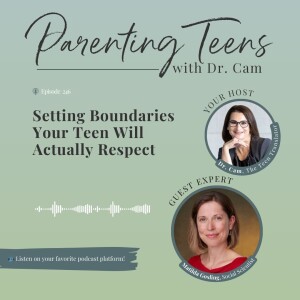


Tuesday May 20, 2025
Setting Boundaries Your Teen Will Actually Respect
Tuesday May 20, 2025
Tuesday May 20, 2025
If setting boundaries with your teen feels like trying to nail Jell-O to a wall—you’re not alone. In this episode of Parenting Teens with Dr. Cam, I sit down with Matilda Gosling, social scientist and author of Teenagers: The Evidence Base, to break down the science behind boundary-setting that actually works. No more power struggles. No more guessing games. Just real, research-backed strategies to help you protect your teen and prepare them for the real world.
Matilda brings both the data and the empathy, helping parents understand where to draw the line, when to back off, and how to keep the relationship strong while doing it. If you’ve ever asked yourself, “Am I being too strict? Too lenient?”—this episode is your answer.
WHAT YOU'LL LEARN IN THIS EPISODE
Why boundaries help teens feel safe, not smothered
How to focus on the rules that really matter (and ditch the ones that don’t)
The difference between control and influence—and why one actually works
How to set your own boundaries without feeling guilty or selfish
5 KEY TAKEAWAYS FOR PARENTS OF TEENS
Prioritize the big stuff: Health, safety, and emotional well-being come first. Let go of the small battles.
Your boundaries matter too: You’re allowed to have limits—and your teen needs to see them.
Respect their privacy: Snooping leads to secrets. Trust builds openness.
Explain, don’t dictate: When teens understand the why, they’re more likely to follow through.
Mistakes are part of the process: Boundaries aren’t about perfection—they’re about growth.
🎧❤️ ENJOYING THE SHOW? Don’t keep it to yourself! Share your favorite episode and leave a rating and review to help other parents find the support they need. Your feedback helps me create even more episodes filled with practical tips for you and your family! Thanks so much for your support! 🙏💫
🔔 Remember to hit SUBSCRIBE so you never miss another solution-packed episode! 🙌
RESOURCES MENTIONED IN THIS EPISODE
Matilda Gosling's Substack (Sign up to get a free PDF Q&A on teen mental health!)
Book: Teenagers: The Evidence Base by Matilda Gosling
Book: The Anxious Generation by Jonathan Haidt
CONNECT WITH OUR GUEST: Matilda Gosling
Website: matildagosling.substack.com
Instagram: @matilda.gosling
LinkedIn: Matilda Gosling
X/Twitter: @matildagosling
CONNECT WITH YOUR HOST: Dr. Cam Caswell
Website: AskDrCam.com
Instagram: @DrCamCaswell
TikTok: @the.teen.translator
YouTube: Parenting Teens with Dr. Cam
Facebook: @DrCamCaswell
EPISODE CHAPTERS:
00:00 Understanding Teen Boundaries 02:59 The Importance of Independence 05:48 Defining Boundaries vs. Rules 09:04 Negotiating Boundaries with Teens 12:02 Common Mistakes Parents Make 15:02 The Role of Safetyism 18:08 Respecting Teen Privacy 20:56 Identifying Important Boundaries 23:46 Setting Parental Boundaries 27:06 The Importance of Modeling Behavior 29:57 Navigating Emotional Responses 32:49 Final Thoughts on Boundaries
ABOUT THE SHOW
The Parenting Teens with Dr. Cam Podcast is your go-to resource for navigating the challenges of raising teenagers. Hosted by Dr. Cam Caswell, an adolescent psychologist and certified parenting coach, this podcast offers practical parenting strategies, expert advice, and real-world insights to help you build a stronger relationship with your teen and support their emotional growth. Whether you’re struggling with teenage behavior or looking to improve communication, each episode provides actionable tips to make parenting teens easier and more rewarding. Perfect for both new and seasoned parents, this podcast helps you build the confidence to handle teen challenges and thrive together.
#theteentranslator #parentingteenswithdrcam #teenboundaries #parentingteens
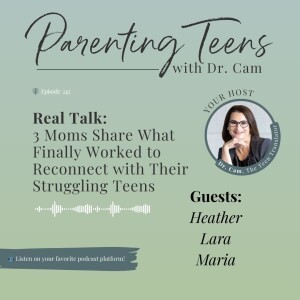


Tuesday May 13, 2025
Real Talk: 3 Moms Share What Finally Worked to Reconnect with Their Teens
Tuesday May 13, 2025
Tuesday May 13, 2025
In this powerful and heartfelt episode, Dr. Cam sits down with three courageous moms—Heather, Lara, and Maria—who open up about the emotional rollercoaster of raising teens through tough issues like self-harm, emotional regulation struggles, vaping, and academic burnout. These women, all members of Dr. Cam’s Inner Circle, share what it was like before they found support, and how everything changed when they stopped trying to control their teens and started learning how to truly connect. If you’re feeling frustrated, scared, or unsure how to help your teen without pushing them away, this episode offers real hope and practical guidance from parents who’ve been there.
WHAT YOU'LL LEARN IN THIS EPISODE
How to reconnect with your teen when communication has broken down
Why letting go of control can strengthen your relationship with your teenager
The impact of emotional regulation challenges on teen behavior—and how to respond
What a supportive parenting community can do for your confidence and peace of mind
5 KEY TAKEAWAYS FOR PARENTS OF TEENS
Letting go of control builds trust and makes space for connection with your teen
Choosing one parenting value helps guide consistent, intentional responses
Allowing natural consequences helps teens learn from experience without constant lecturing
Empathetic listening without jumping in to fix builds emotional safety
Having a parenting support group offers relief, encouragement, and real-life strategies
🎧❤️ ENJOYING THE SHOW?
Don’t keep it to yourself! Share your favorite episode and leave a rating and review to help other parents find the support they need. Your feedback helps me create even more episodes filled with practical tips for you and your family! Thanks so much for your support! 🙏💫
🔔 Remember to hit SUBSCRIBE so you never miss another solution-packed episode! 🙌
RESOURCES MENTIONED IN THIS EPISODE
Dr. Cam's Inner Circle - A weekly support group for parents of teenagers where they can share challenges, learn strategies, and receive guidance from Dr. Cam and other parents. Join us at: https://www.askdrcam.com/innercircle
CONNECT WITH YOUR HOST: Dr. Cam Caswell
Website: AskDrCam.com
Instagram: @DrCamCaswell
TikTok: @the.teen.translator
YouTube: Parenting Teens with Dr. Cam
Facebook: @DrCamCaswell
ABOUT THE SHOW
The Parenting Teens with Dr. Cam Podcast is your go-to resource for navigating the challenges of raising teenagers. Hosted by Dr. Cam Caswell, an adolescent psychologist and certified parenting coach, this podcast offers practical parenting strategies, expert advice, and real-world insights to help you build a stronger relationship with your teen and support their emotional growth. Whether you’re struggling with teenage behavior or looking to improve communication, each episode provides actionable tips to make parenting teens easier and more rewarding. Perfect for both new and seasoned parents, this podcast helps you build the confidence to handle teen challenges and thrive together. #theteentranslator #drcam #parentingteensupport #reconnectwithyourteen
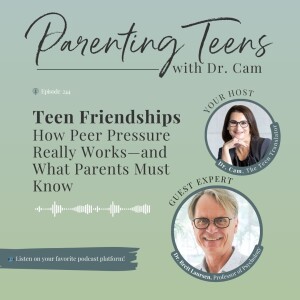


Tuesday May 06, 2025
Teen Friendships: How Peer Pressure Really Works—and What Parents Must Know
Tuesday May 06, 2025
Tuesday May 06, 2025
Worried about the impact your teen’s friends are having on them? You’re not alone—and it’s not as simple as “good” or “bad” peer pressure. In this episode of Parenting Teens with Dr. Cam, I sit down with peer influence expert Dr. Brett Laursen to unpack how friendships actually shape teen behavior (often for the better!) and how parents can stay influential without being controlling. Dr. Laursen, who has decades of research tracking teen friendships across multiple countries, shares surprising insights that can help you guide your teen through the tricky world of social dynamics, middle school transitions, and online influence. If you’ve ever wondered, "Am I losing my teen to their friends?" — this conversation is a must-listen.
WHAT YOU'LL LEARN IN THIS EPISODE
Why peer pressure isn't always a bad thing and can actually drive positive behavior in teens
How to stay relevant as a parent even when friends seem to have more influence
What to do (and NOT do) if you're worried about your teen's friends
How online and real-world friendships impact vulnerable teens differently
5 KEY TAKEAWAYS FOR PARENTS OF TEENS
Friendship first, influence second: Teens choose friends who are similar to them, not the other way around.
Middle school changes everything: The shift from adult-centered to peer-centered social life demands a new parenting approach.
Stay connected, don't compete: Your teen needs a supportive parent, not a rival for attention.
Opportunities, not ultimatums: Help your teen find better friendships by fostering their interests, not forcing social changes.
Humanize yourself: Teens respect advice more when they see you as a real person, not just an authority figure.
🎧❤️ ENJOYING THE SHOW?
Don’t keep it to yourself! Share your favorite episode and leave a rating and review to help other parents find the support they need. Your feedback helps me create even more episodes filled with practical tips for you and your family! Thanks so much for your support! 🙏💫
🔔 Remember to hit SUBSCRIBE so you never miss another solution-packed episode! 🙌
CONNECT WITH OUR GUEST: Dr. Brett Laursen
Website: https://www.fau.edu/science/psychology/laursen-lab/
Email: laursen@fau.edu
CONNECT WITH YOUR HOST: Dr. Cam
Website: AskDrCam.com
Instagram: @DrCamCaswell
YouTube: Parenting Teens with Dr. Cam
Facebook: @DrCamCaswell
EPISODE CHAPTERS
00:00 Understanding Peer Pressure in Teens 03:01 The Dual Nature of Peer Influence 05:46 Navigating Friendships: The Parent's Dilemma 08:53 The Shift to Peer-Driven Social Structures 12:12 The Importance of Positive Relationships 15:10 Managing Friendships: When to Intervene 18:12 Supporting Kids Who Struggle to Make Friends 21:08 The Role of Online Influences 23:54 Building Trust and Communication with Teens 27:01 Humanizing Parental Relationships 29:55 Final Thoughts on Peer Influence and Parenting
ABOUT THE SHOW
The Parenting Teens with Dr. Cam Podcast is your go-to resource for navigating the challenges of raising teenagers. Hosted by Dr. Cam Caswell, an adolescent psychologist and certified parenting coach, this podcast offers practical parenting strategies, expert advice, and real-world insights to help you build a stronger relationship with your teen and support their emotional growth. Whether you’re struggling with teenage behavior or looking to improve communication, each episode provides actionable tips to make parenting teens easier and more rewarding. Perfect for both new and seasoned parents, this podcast helps you build the confidence to handle teen challenges and thrive together.
#theteentranslator #drcamcaswell #teenpeerpressure #parentingteenfriendships
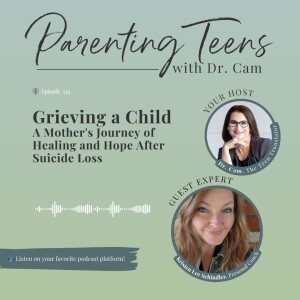


Tuesday Apr 29, 2025
Grieving a Child: A Mother's Journey of Healing and Hope After Suicide Loss
Tuesday Apr 29, 2025
Tuesday Apr 29, 2025
When you lose a child, everything changes. In this powerful episode of Parenting Teens with Dr. Cam, we meet Kristen Schindler, a courageous mother who shares her journey through the devastating loss of her 21-year-old son, Gavin, to suicide. Kristin opens up about navigating grief while parenting her other children, how undiagnosed physical and mental health issues played a hidden role, and the steps she’s taken to find healing, hope, and purpose.
If you're a parent terrified of missing warning signs or struggling to support a grieving family, Kristen’s story reminds us that love alone can't shield our kids from life's hardest battles—and that healing, while messy, is possible. This conversation offers real tools, deep compassion, and hope for anyone touched by loss.
Kristen Schindler is a passionate advocate for suicide awareness, a mother of faith, and a living example of resilience. Through her story, she helps other parents navigate the unimaginable with grace, honesty, and strength.
WHAT YOU'LL LEARN IN THIS EPISODE
Why even the most attentive parents can’t always predict or prevent teen suicide
How hidden physical health issues (like undiagnosed heart problems) can impact mental health
Why “grief masking” hurts more than it helps—and how to truly process loss
How to create new family traditions that honor lost loved ones and foster healing
5 KEY TAKEAWAYS FOR PARENTS OF TEENS
You can be a great parent and still face unimaginable loss: Kristen’s story removes shame and blame from grief.
Physical health affects mental health: Undiagnosed conditions can silently worsen depression and anxiety.
Grief isn't linear or tidy: Healing doesn't follow a timeline—and that's normal.
"Grief masking" backfires: Hiding your pain for others' comfort only deepens long-term wounds.
Honoring loved ones through new traditions brings hope: Small acts of kindness can keep memories alive and help families heal together.
🎧❤️ ENJOYING THE SHOW?
Don’t keep it to yourself! Share your favorite episode and leave a rating and review to help other parents find the support they need. Your feedback helps me create even more episodes filled with practical tips for you and your family! Thanks so much for your support! 🙏💫
🔔 Remember to hit SUBSCRIBE so you never miss another solution-packed episode! 🙌
RESOURCES MENTIONED IN THIS EPISODE
Free Space for Grace Workbook
Gavin’s Celebration of Life Tribute Watch on YouTube
CONNECT WITH OUR GUEST: Kristen Schindler
Website: www.kristenleeschindler.com
Facebook: @kristen.schindler.3
Instagram: @all.the.things.kls
LinkedIn: https://www.linkedin.com/in/kristen-schindler-2a8b755/
YouTube: @kristenschindler9786e
CONNECT WITH YOUR HOST: Dr. Cam Caswell
Website: AskDrCam.com
Instagram: @DrCamCaswell
TikTok: @the.teen.translator
YouTube: Parenting Teens with Dr. Cam
Facebook: @DrCamCaswell
EPISODE CHAPTERS:
00:00 Navigating Grief: A Personal Journey 03:02 The Impact of Loss on Family Dynamics 06:04 Understanding Mental Health Challenges 08:58 The Role of Faith in Healing 11:59 The Complexity of Grief and Healing 15:00 Lessons Learned from Loss 18:14 The Importance of Open Communication 21:04 Finding Joy Amidst Grief 23:59 Empowering Parents in the Face of Loss 32:06 Navigating Grief and Loss 34:55 The Impact of Addiction on Families 37:04 Finding Purpose in Pain 39:54 The Importance of Community and Support 43:14 Transforming Grief into Empathy 48:00 Honoring Loved Ones Through Kindness 52:39 Lessons for Parents in Grief
ABOUT THE SHOW
The Parenting Teens with Dr. Cam Podcast is your go-to resource for navigating the challenges of raising teenagers. Hosted by Dr. Cam Caswell, an adolescent psychologist and certified parenting coach, this podcast offers practical parenting strategies, expert advice, and real-world insights to help you build a stronger relationship with your teen and support their emotional growth. Whether you’re struggling with teenage behavior or looking to improve communication, each episode provides actionable tips to make parenting teens easier and more rewarding. Perfect for both new and seasoned parents, this podcast helps you build the confidence to handle teen challenges and thrive together. #theteentranslator #drcamcaswell #parentingteenswithdrcam
#grievingaparent #suicidelossawareness
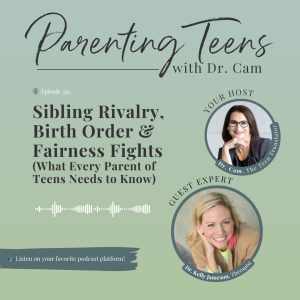


Tuesday Apr 15, 2025
Tuesday Apr 15, 2025
Ever feel like your kids are growing up in totally different households—even though they share the same last name and dinner table? Your oldest follows all the rules, your middle child avoids conflict like it’s their full-time job, and your youngest? Total chaos with a side of charm.
In this episode, Dr. Cam sits down with Dr. Kelly Jameson, a therapist, speaker, and expert on birth order psychology and sibling dynamics, to decode what’s really going on behind your kids’ clashing personalities—and what to do when fairness feels impossible. If you’ve ever second-guessed how you parent each child (spoiler: you're not imagining it), this episode is packed with eye-opening truths and practical solutions.
WHAT YOU'LL LEARN IN THIS EPISODE
How birth order shapes your teen’s personality and behavior
Why sibling rivalry is normal—and how to handle it without picking sides
What “fair” parenting really looks like (and why it’s not the same for every child)
How to parent your firstborn, middle, and youngest without losing your mind
5 KEY TAKEAWAYS FOR PARENTS OF TEENS
Birth order isn’t just theory—it deeply influences how each child behaves, connects, and competes
Sibling rivalry often stems from a fight for limited parental attention—not bad behavior
Fairness in parenting means meeting each child where they are developmentally, not treating them identically
Older siblings shouldn’t be forced to parent younger ones—it breeds resentment, not responsibility
Creating rituals, one-on-one time, and shared experiences helps reduce tension and build sibling bonds
🎧❤️ ENJOYING THE SHOW?
Don’t keep it to yourself! Share your favorite episode and leave a rating and review to help other parents find the support they need. Your feedback helps me create even more episodes filled with practical tips for you and your family! Thanks so much for your support! 🙏💫
🔔 Remember to hit SUBSCRIBE so you never miss another solution-packed episode! 🙌
RESOURCES MENTIONED IN THIS EPISODE
Dr. Kelly Jameson’s Website
CONNECT WITH OUR GUEST: Dr. Kelly Jameson
Website: drkellyjameson.comInstagram: @drkellyjameson
CONNECT WITH YOUR HOST: Dr. Cam Caswell
Website: AskDrCam.comInstagram: @DrCamCaswellYouTube: Parenting Teens with Dr. CamFacebook: @DrCamCaswell
EPISODE CHAPTERS:
00:00 Understanding Birth Order Dynamics06:11 Sibling Rivalry and Parental Attention08:47 Navigating Fairness in Parenting12:38 Intervening in Sibling Conflicts18:05 Supporting Siblings Through Challenges20:39 The Dynamics of Sibling Relationships24:49 Navigating Sibling Rivalry and Conflict29:36 Understanding Birth Order and Its Impact32:35 Tailoring Parenting Strategies by Birth Order39:45 Key Takeaways for Parents
ABOUT THE SHOW
The Parenting Teens with Dr. Cam Podcast is your go-to resource for navigating the challenges of raising teenagers. Hosted by Dr. Cam Caswell, an adolescent psychologist and certified parenting coach, this podcast offers practical parenting strategies, expert advice, and real-world insights to help you build a stronger relationship with your teen and support their emotional growth. Whether you’re struggling with teenage behavior or looking to improve communication, each episode provides actionable tips to make parenting teens easier and more rewarding. Perfect for both new and seasoned parents, this podcast helps you build the confidence to handle teen challenges and thrive together.
#birthorderpsychology #siblingrivalrytips
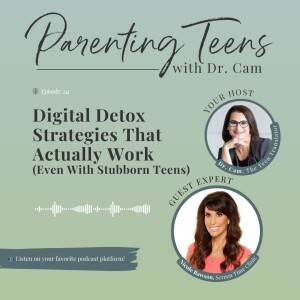


Tuesday Apr 08, 2025
Digital Detox Strategies That Actually Work (Even With Stubborn Teens)
Tuesday Apr 08, 2025
Tuesday Apr 08, 2025
Tired of fighting over screen time with your teen? Then this episode is for you. Dr. Cam sits down with digital wellness expert Nicole Rawson, founder of Screen Time Clinic, to tackle one of today’s biggest parenting challenges: teen screen addiction.
Nicole shares why traditional limits don’t work anymore, how to spot warning signs early, and what a real digital detox looks like (hint: it’s not just unplugging the Wi-Fi).
If you're ready to take back control, reconnect with your teen, and restore peace in your home, don’t miss this conversation.
WHAT YOU'LL LEARN IN THIS EPISODE
How excessive screen time rewires your teen’s brain and behavior
Why some teens are more sensitive to screen addiction than others
What actually works when a teen is addicted to their phone or gaming
How to do a digital detox with your teen instead of against them
5 KEY TAKEAWAYS FOR PARENTS OF TEENS
Complete digital detox is more effective than moderation for addicted teens
Structure and planning are essential for a successful screen break
Withdrawal is a red flag—not just “normal teen stuff”
Parents must model healthy digital habits to help their teens reset
Replacing screen time with meaningful, engaging activities is key to long-term success
🎧❤️ ENJOYING THE SHOW? Don’t keep it to yourself! Share your favorite episode and leave a rating and review to help other parents find the support they need. Your feedback helps me create even more episodes filled with practical tips for you and your family! Thanks so much for your support! 🙏💫
🔔 Remember to hit SUBSCRIBE so you never miss another solution-packed episode! 🙌
RESOURCES MENTIONED IN THIS EPISODE
Reset Your Child’s Brain by Dr. Victoria Dunckley
ScreenTimeClinic.com
Free Digital Detox Newsletter & Guide
CONNECT WITH OUR GUEST: Nicole Rawson
Website: ScreenTimeClinic.com
Instagram: @screentimeclinic
CONNECT WITH YOUR HOST: Dr. Cam Caswell
Website: AskDrCam.com
Instagram: @DrCamCaswell
TikTok: @the.teen.translator
YouTube: Parenting Teens with Dr. Cam
Facebook: @DrCamCaswell
EPISODE CHAPTERS
00:00 Understanding Screen Time Concerns 03:04 The Impact of Screen Time on Teens 05:53 Identifying Sensitivity to Digital Media 08:54 Implementing Digital Detox Strategies 12:00 Navigating Resistance from Teens 15:02 Recognizing Signs of Addiction 18:12 Healthy Coping Mechanisms for Teens 26:54 The Impact of Screen Time on Family Dynamics 31:10 Understanding Teen Addiction to Screens 36:49 Building Healthy Structures for Teens 41:54 The Role of Parents in Digital Detox
ABOUT THE SHOW
The Parenting Teens with Dr. Cam Podcast is your go-to resource for navigating the challenges of raising teenagers. Hosted by Dr. Cam Caswell, an adolescent psychologist and certified parenting coach, this podcast offers practical parenting strategies, expert advice, and real-world insights to help you build a stronger relationship with your teen and support their emotional growth. Whether you’re struggling with teenage behavior or looking to improve communication, each episode provides actionable tips to make parenting teens easier and more rewarding. Perfect for both new and seasoned parents, this podcast helps you build the confidence to handle teen challenges and thrive together.
#screentime #digitaldetox #parentingteens #theteentranslator #drcamcaswell #parentingteenswithdrcam
